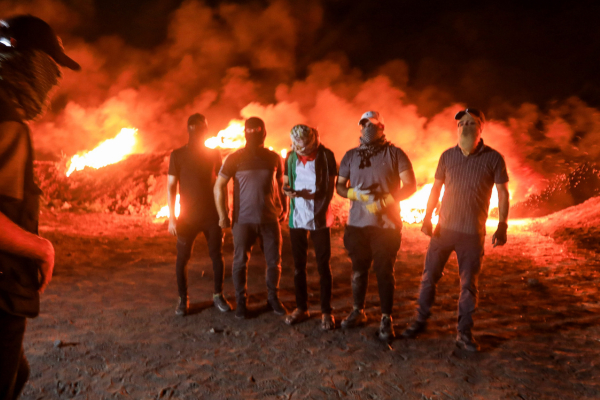The vast majority of respondents believe that Hamas did not commit atrocities during the October 7 attack.
By Chaim Lax, HonestReporting
On March 20, 2024, the Palestinian Center for Policy and Survey Research published the results of its quarterly survey on the sentiments within Palestinian society regarding Israel, the ongoing war in Gaza, internal Palestinian politics, and the international community.
With much of the media’s attention turned to Gaza and Judea and Samaria, and with Western leaders hoping to restart negotiations for a two-state solution between Israel and the Palestinians, one would think that the results of this survey would have been covered by all the mainstream media organizations.
However, with limited exceptions, practically no mainstream news outlet outside of Israel even reported on this survey’s findings and those that did cover it (Newsweek, The New Yorker, NBC News, and USA Today) only reported on certain results while ignoring others.
New poll from PCPSR regarding Palestinian opinion in the West Bank and Gaza.
PCPSR is a reputable source for Palestinian public opinion according to most experts.
This thread 🧵 will highlight the shocking resultshttps://t.co/t4VkezMidp
— Israel War Room (@IsraelWarRoom) March 20, 2024
In its report on the survey’s findings, NBC News highlighted the fact that support for Hamas has dropped among both Palestinians in Judea, Samaria, and Gaza. NBC also reported that, among Gazans, support for “armed armed struggle” has dropped while support for a two-state solution has risen.
The New Yorker similarly noted the seemingly promising results concerning the lower support for “armed struggle,” and the rise in support for a two-state solution among Gazans.
However, there are several flies in the ointment.
For example, while support for Hamas has fallen within Palestinian society, it is still the organization with the most support among Palestinians in both Gaza and Judea and Samaria, and its support in Judea and Samaria is still 20% higher than it was in September 2023 (before the October 7 attack and subsequent Israeli war against Hamas).
Furthermore, in response to a question about who Palestinians would vote for if another election was held today, Hamas still enjoys the most support among the Palestinian electorate, and it continues to poll higher today than it did in September 2023 (30% in March 2024 versus 21% in September).
Overall, Palestinians want Hamas back in power in Gaza, by a strong majority. pic.twitter.com/QGdQCOA5pz
— Israel War Room (@IsraelWarRoom) March 20, 2024
Similarly, while it is true that support for “armed struggle” has fallen among those surveyed, it is still supported by the largest percentage of respondents — and in Judea and Samaria, it is supported by the majority.
As both NBC News and the New Yorker noted, support for a two-state solution has risen among Palestinian respondents in Gaza.
However, in Judea and Samaria (which would likely also be part of a two-state solution), support for a two-state solution hovered around little more than 30%.
Even in Gaza, where support for a two-state solution has risen to 62%, 52% of respondents opposed the restarting of negotiations for a two-state solution.
Other noteworthy results from this survey include:
- The number of respondents who support Hamas’ launching of the October 7 attacks rose 14% in Gaza compared to December 2023, but dropped 11 percentage points to 71% in Judea and Samaria.
- The vast majority of respondents believe that Hamas did not commit atrocities during the October 7 attack. Among those who have watched videos from the attack, 81% believe that Hamas did not commit atrocities, while among those who did not watch these videos, the number rises to 97%.
- Among Gazan respondents, the vast majority (70%) reported that aid distribution in the war-torn territory was discriminatory. Broken down, 90% said that aid distributed by local Palestinian groups was given out in a discriminatory fashion, while 70% said the same for aid given out by UNRWA.
- The percentage of Palestinians who blame Hamas for the current suffering in Gaza dropped from 11% to 7% between December 2023 and March 2024. Among Gazans, the number of people who blame Hamas for their suffering dropped from 19% to 9% during this time period.
- In both Gaza and Judea and Samaria, the vast majority are still satisfied with the way Hamas and Yahya Sinwar have performed during the current war. While satisfaction with Hamas’ performance dropped to 75% in Judea and Samaria, satisfaction with Hamas among Gazans actually rose 10 points to 62% since December 2023.
By either disregarding the entire survey or only focusing on a select few results, the media appears to be intent on continuing to spread the narrative that a two-state solution is tenable in the near future (and that a failure to reach one will fall largely at the feet of Israel’s right-wing government), that Hamas does not represent the Palestinians, and that UNRWA is a legitimate provider of aid in Gaza.
By choosing to continue with its simplistic image of Palestinian society by largely ignoring the uncomfortable results found in this survey, the media has not only failed to provide its audience with a complete picture of the situation in Gaza and Judea and Samaria, it is also helping to construct a false paradigm through which foreign policymakers and domestic electorates will view the current conflict between Israel and Hamas.
